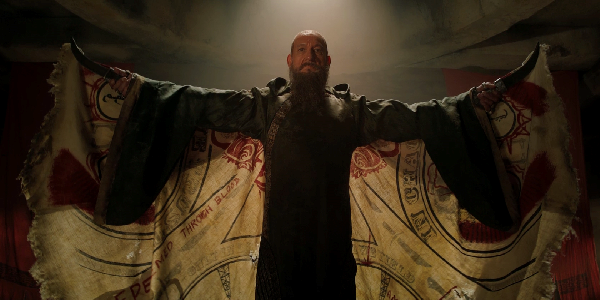3. Political Commentary

Though the film misses the opportunity (perhaps consciously) to overtly explore the political ramifications of PTSD in soldiers (in the form of the Extremis soldiers,) there is an explicit commentary on the effect that war and terror can have on people, as portrayed in Tony Stark's circumstances. He is struggling to come to terms with New York, and though there are scant open references to the Avengers and what happened during that film's narrative, we get the sense all the way through that the events are as indelibly impressed on Stark as the scorch-marks of bomb-blast victims we see as a recurrent motif in the film. That isn't the end of the film's political statements, though, no matter how restrained they might seem - just as Black and Pearce use the Mandarin to reflect on the state of film-making and the continued demonisation of foreign figures, they also deftly comment on how modern governments also use the same mechanics to attach added blame to despotic villains in the real world. There is obviously no suggestion that their crimes aren't heinous, but that doesn't mean the culture of demonisation is to be considered healthy in any way, and that is exactly the dynamic that underpins the major twist in The Mandarin's tale.
 Though the film misses the opportunity (perhaps consciously) to overtly explore the political ramifications of PTSD in soldiers (in the form of the Extremis soldiers,) there is an explicit commentary on the effect that war and terror can have on people, as portrayed in Tony Stark's circumstances. He is struggling to come to terms with New York, and though there are scant open references to the Avengers and what happened during that film's narrative, we get the sense all the way through that the events are as indelibly impressed on Stark as the scorch-marks of bomb-blast victims we see as a recurrent motif in the film. That isn't the end of the film's political statements, though, no matter how restrained they might seem - just as Black and Pearce use the Mandarin to reflect on the state of film-making and the continued demonisation of foreign figures, they also deftly comment on how modern governments also use the same mechanics to attach added blame to despotic villains in the real world. There is obviously no suggestion that their crimes aren't heinous, but that doesn't mean the culture of demonisation is to be considered healthy in any way, and that is exactly the dynamic that underpins the major twist in The Mandarin's tale.
Though the film misses the opportunity (perhaps consciously) to overtly explore the political ramifications of PTSD in soldiers (in the form of the Extremis soldiers,) there is an explicit commentary on the effect that war and terror can have on people, as portrayed in Tony Stark's circumstances. He is struggling to come to terms with New York, and though there are scant open references to the Avengers and what happened during that film's narrative, we get the sense all the way through that the events are as indelibly impressed on Stark as the scorch-marks of bomb-blast victims we see as a recurrent motif in the film. That isn't the end of the film's political statements, though, no matter how restrained they might seem - just as Black and Pearce use the Mandarin to reflect on the state of film-making and the continued demonisation of foreign figures, they also deftly comment on how modern governments also use the same mechanics to attach added blame to despotic villains in the real world. There is obviously no suggestion that their crimes aren't heinous, but that doesn't mean the culture of demonisation is to be considered healthy in any way, and that is exactly the dynamic that underpins the major twist in The Mandarin's tale.